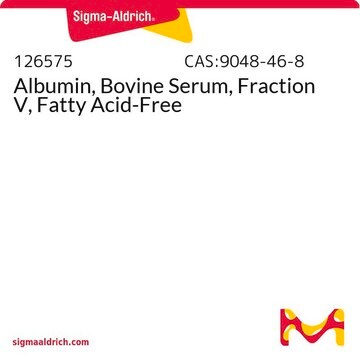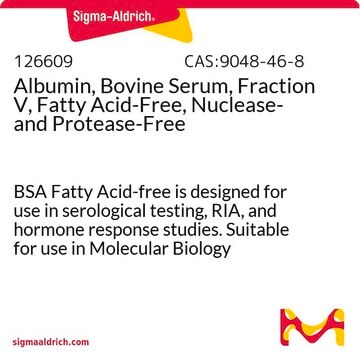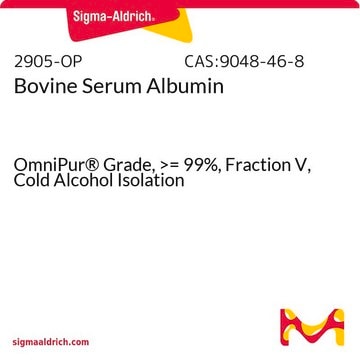126579
Albumin, Bovine Serum, Fraction V, Fatty Acid-Poor, Endotoxin-Free
Sinónimos:
Albumin, Bovine Serum, Fraction V, Fatty Acid-Poor, Endotoxin-Free
About This Item
Productos recomendados
assay
≥95% (Albumin, electrophoresis)
form
lyophilized powder
manufacturer/tradename
Calbiochem®
storage condition
OK to freeze
impurities
≤0.2% fatty acids
≤2.0% Ash
≤5% moisture
≤50 EU/mg endotoxins
color
pale green
solubility
aqueous buffer: 20 mg/mL
water: 20 mg/mL
shipped in
ambient
storage temp.
2-8°C
General description
Application
Biochem/physiol Actions
Warning
Preparation Note
Reconstitution
Legal Information
Storage Class
11 - Combustible Solids
wgk_germany
WGK 3
flash_point_f
Not applicable
flash_point_c
Not applicable
Certificados de análisis (COA)
Busque Certificados de análisis (COA) introduciendo el número de lote del producto. Los números de lote se encuentran en la etiqueta del producto después de las palabras «Lot» o «Batch»
¿Ya tiene este producto?
Encuentre la documentación para los productos que ha comprado recientemente en la Biblioteca de documentos.
Los clientes también vieron
Nuestro equipo de científicos tiene experiencia en todas las áreas de investigación: Ciencias de la vida, Ciencia de los materiales, Síntesis química, Cromatografía, Analítica y muchas otras.
Póngase en contacto con el Servicio técnico








